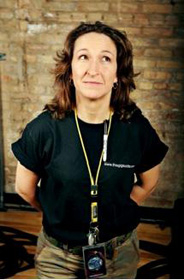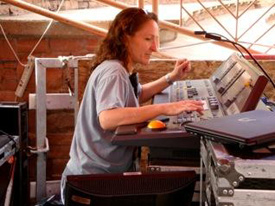Theater major landed her first music gig six days after graduation and has been on the road ever since

“I have the greatest job in the world. No doubt about it,” says Libby Gray.
As a rock ’n’ roll lighting designer for the past 24 years, she has traveled 200 days out of each year with some of the world’s greatest rock musicians. Gray has toured with groups such as Styx, Def Leppard and REO Speedwagon, as well as jazz-soul guitarist George Benson, among others. She recalls doing a show in Venezuela in the ‘90s where she was escorted everywhere by a teenager carrying an UZI, and the time that Benson played Grand Party Communist Hall at the Kremlin in Moscow.
Gray says she sees herself as a global citizen with the dust of the world on her feet.
“I haven’t been to South Africa or Antarctica yet . . . and I haven’t lit a show in a cave,” says Gray, 46.
When Gray was a 16-year-old student at Glen Cove High School on New York’s Long Island, she had what she calls an “epiphany moment.” Someone on the theater crew had to learn how to use the lighting-control console, which, in 1984, Gray says was the size of three large refrigerators. Gray volunteered.
As Gray tells it, she locked herself in the theater one weekend, hell-bent on learning how to use the equipment. Gray climbed up and down a giant steel ladder, trying to make just one light go up on stage: plugging, unplugging, re-plugging, for hours.
Just when she was about to give up, she says, “one solitary light came up center stage and I said to myself, ‘I’m going to do this for the rest of my life.’ ”
But Gray kept this knowledge a secret until she was in college, at Rutgers, and had to choose a major. The Douglass student declared a B.A. in Theater Arts at the Mason Gross School of the Arts.
“My parents were underwhelmed, to say the least,” says Gray. She was a Douglass Scholar, on a full academic scholarship to Rutgers, and her parents had hoped she would use her academic aptitude to become a doctor, or a lawyer. Instead, Gray spent every moment she could at the university’s Cabaret Theatre, and she would travel to New York City on weekends to volunteer as lighting crew for off-Broadway shows.
But Gray says she felt most fulfilled lighting rock ’n’ roll performances. Theatergoers clap politely for a play, she says. But rock ’n’ roll audiences – in her experience – scream, jump up and down, and lose themselves in the experience of a show. Gray revels in the high-energy environment, she says, and feels artistically satisfied with the instinctively emotional role lighting plays in rock ’n’ roll performances.
“There’s hardly ever an unappreciative audience in rock ’n’ roll,” says Gray.
‘On the bus’
She landed her first music gig six days after graduating from Rutgers and has been on the road ever since.
Though she is technically freelance, Gray says her main gig, Styx, feels like a full-time job.
“The same way a band has a trademark sound, they also have trademark lighting,” says Gray. She spends half of her time at home in Virginia, planning the skeletal structure of the lighting show for different venues across the country.
“I build sand castles, just with lights,” Gray says.
When Gray isn’t planning the look of a show, she’s touring with the band – which means living on a bus, Gray says, for months at a time.
“We have this saying in rock ’n’ roll: ‘You’re either on the bus, or you’re not,’ ” says Gray. And Gray is often the only woman on that bus. Many times, when the bus arrives at a venue, she says she’ll be the only woman in the building all day, “until the box-office girls show up,” right before the house opens. But she’s been at it so long that she says she doesn’t even notice it anymore. Gray says she never accepted discrimination, but she also doesn’t claim to have changed the industry by being a woman.

“I didn’t change rock ’n’ roll; rock ’n’ roll changed me,” says Gray. In the ‘80s, a woman on a tour bus was unheard of, but now Gray is just one of the “guys,” a non-gendered term in the rock ’n’ roll world, according to Gray. If the crew is up to their knees pulling cable in mud and elephant pee – yes, this has happened – so is Gray.
When it comes down to it, she says, it’s her job to do her job; a job that is incredibly rewarding, physically exhausting, and often dangerous. She isn’t home to attend holidays, weddings, or birthdays—she couldn’t even attend her grandparents’ funerals. There are no sick days in rock ’n’ roll, says Gray.
Yet Gray has no desire to stop touring. At 46, sleeping on the bus has gotten harder, but as long as her body can keep pace with the workload, Gray plans on being on that bus.
“I want to be on the crew that does the first rock show on the moon,” says Gray. “There’s going to be a lot of competition, but I’m going to get it.”